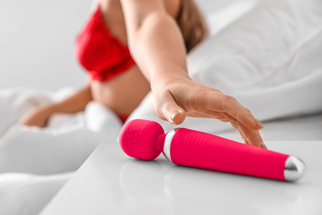Unlocking the Power of Self-Pleasure: Insights for Women
Hey there, lovely ladies! Let's talk about something that's often whispered about but rarely discussed openly: self-pleasure. It's time to shed the stigma and embrace this natural, healthy practice that can bring a world of benefits to your life. In this guide, we'll explore the numerous advantages of self-pleasure for women, backed by science and expert insights. So, get comfortable, and let's dive into this empowering journey of self-discovery and sexual wellness!
Why Self-Pleasure Matters
Before we delve into the benefits, let's address the elephant in the room. Self-pleasure, or masturbation, is a normal and healthy part of human sexuality. According to the National Survey of Sexual Health and Behavior, about 80% of women ages 18-59 have engaged in self-pleasure at some point in their lives. Despite this, many women still feel shame or guilt around the practice. It's time to change that narrative!
The Physical Benefits of Self-Pleasure
Stress Relief and Better Sleep
When you engage in self-pleasure, your body releases endorphins and oxytocin, often referred to as "feel-good" hormones. These natural mood boosters can help reduce stress and promote better sleep. A study published in the Journal of Sexual Medicine found that orgasms before bedtime can improve sleep quality.
Pain Management
Those same endorphins that help with stress can also act as natural painkillers. Many women report relief from menstrual cramps and headaches after self-pleasure. While more research is needed, anecdotal evidence suggests it can be an effective pain management tool.
Improved Cardiovascular Health
Believe it or not, self-pleasure can be good for your heart! The increased heart rate and blood flow during sexual activity, including masturbation, can contribute to better cardiovascular health. A study in the American Journal of Cardiology found that women who experienced more orgasms had a lower risk of heart disease.
Strengthened Pelvic Floor Muscles
Regular self-pleasure can help strengthen your pelvic floor muscles. These muscles play a crucial role in bladder control, sexual function, and even supporting your spine. Stronger pelvic floor muscles can lead to more intense orgasms and may help prevent issues like incontinence later in life.
The Mental and Emotional Benefits
Improved Body Image and Self-Esteem
Exploring your body through self-pleasure can lead to greater body acceptance and improved self-esteem. When you become more familiar and comfortable with your body, you're likely to feel more confident both in and out of the bedroom.
Enhanced Sexual Satisfaction
Self-pleasure is an excellent way to learn what feels good for you. This self-knowledge can translate to more satisfying partnered sexual experiences. You'll be better equipped to communicate your desires and guide your partner to please you.
Reduced Sexual Anxiety
For women who experience sexual anxiety, self-pleasure can be a safe way to explore sexuality without the pressure of partnered interactions. It can help you become more comfortable with your sexual responses and reduce anxiety in future sexual situations.
Mood Enhancement
The release of endorphins during self-pleasure can have a lasting positive effect on your mood. Regular self-pleasure has been linked to reduced symptoms of depression and anxiety in some studies.
The Relationship Benefits
Improved Communication
When you're in tune with your own sexual needs and desires, you're better equipped to communicate them to your partner. This can lead to more open, honest conversations about sex and intimacy.
Increased Sexual Confidence
Understanding your body and what brings you pleasure can boost your sexual confidence. This newfound assurance can make partnered sexual experiences more enjoyable and satisfying for both you and your partner.
Maintaining Sexual Health During Dry Spells
Self-pleasure can help maintain sexual health and function during periods without partnered sexual activity. It keeps your sexual responses active and can help prevent issues like vaginal atrophy.
Overcoming Barriers to Self-Pleasure
Despite the numerous benefits, some women still struggle with embracing self-pleasure. Here are some common barriers and how to overcome them:
Guilt or Shame
Remember, self-pleasure is a normal, healthy part of human sexuality. If you're struggling with feelings of guilt or shame, consider speaking with a sex-positive therapist or counselor who can help you work through these emotions.
Lack of Time or Privacy
Make self-pleasure a priority by scheduling "me time" just as you would any other important activity. Invest in a lockable drawer or discreet storage solution for any toys or aids you use to ensure privacy.
Not Knowing Where to Start
If you're new to self-pleasure or want to explore further, start with gentle touch and exploration. Resources like OMGYES offer educational content about female pleasure based on scientific research.
Getting Started with Self-Pleasure
Ready to embark on your self-pleasure journey? Here are some tips to get you started:
Create a Comfortable Environment
Set the mood with soft lighting, comfortable bedding, and perhaps some relaxing music. Make sure you have privacy and won't be interrupted.
Explore Without Expectations
Don't focus on reaching orgasm. Instead, explore different types of touch and sensations to discover what feels good for you.
Use Lubrication
A good quality lubricant can enhance sensations and make the experience more comfortable. Look for body-safe, pH-balanced options.
Consider Incorporating Toys
Sex toys can add variety and intensity to your self-pleasure practice. Start with something simple like a small vibrator and explore from there.
Practice Mindfulness
Stay present in the moment and focus on the sensations you're experiencing. This can enhance pleasure and help you connect more deeply with your body.

